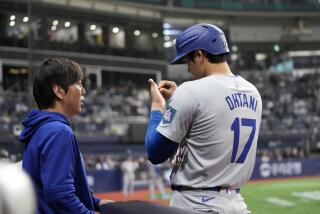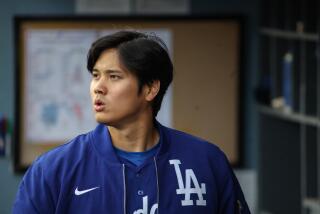Accused Honda Exec’s Lawyer Blames Japanese
Launching a so-called Rising Sun defense, a lawyer for one of two former American Honda Motor Co. executives accused in a federal fraud, racketeering and conspiracy case alleged Monday that the Torrance-based importer’s Japanese officials advocated a scheme involving $15 million in kickbacks.
In opening arguments, Paul Twomey, the New Hampshire attorney who represents defendant Dennis Josleyn, said Japanese officials at American Honda “set up the system and structure that encouraged people to seek out kickbacks and dealers to pay them.”
Josleyn, 47, of Penn Valley, Calif., was the company’s West Coast sales manager from 1983 until he resigned in 1992. He and the company’s former national sales vice president, John Billmyer, 65, of Raleigh, N.C., are on trial in U.S. District Court in Concord, N.H.
Earlier this month, co-defendant Stanley James Cardiges of Laguna Hills entered a surprise last-minute guilty plea. Both Josleyn and Billmyer, who retired in 1988, have pleaded innocent to charges ranging from racketeering and mail fraud to conspiracy to commit mail fraud.
The Rising Sun defense--a name derived from a Michael Crichton novel of the same name that criticized Japanese business practices in the United States--was raised last month by the attorney for Cardiges, the former American Honda senior vice president who government prosecutors allege was the mastermind behind the bribery scheme.
Before he pleaded guilty, Cardiges was being portrayed by his attorney as a scapegoat. “I challenge the government to tell you that they have no information that the Japanese management (of American Honda) didn’t know and approve of whatever was going on,” defense lawyer Philip D. Israels said in a January interview with The Times. “I challenge the government to tell you that what they call corrupt practices are not pervasive throughout the industry.” Israels could not be reached for comment Monday.
American Honda initially would not comment Monday on Twomey’s allegation, stating through a spokesman that “the case is in trial now, so at this point it is important we not say anything to jeopardize the integrity of the trial.”
Later in the day, however, the company issued a formal statement castigating the type of defense that Twomey seems to be setting up. “Under our justice system,” the statement said, “it is not uncommon for criminal defense lawyers to attack the reputation of innocent people or companies or otherwise to divert blame from their client in order to misdirect a jury. Therefore, it is entirely predictable that the defendants (in this case) would make unproven allegations that attempt to place the blame elsewhere.”
The statement repeated the company’s long-held position that it was a victim of “reprehensible activities” by a group of renegade executives “who abused Honda’s reputation and defrauded our company.”






